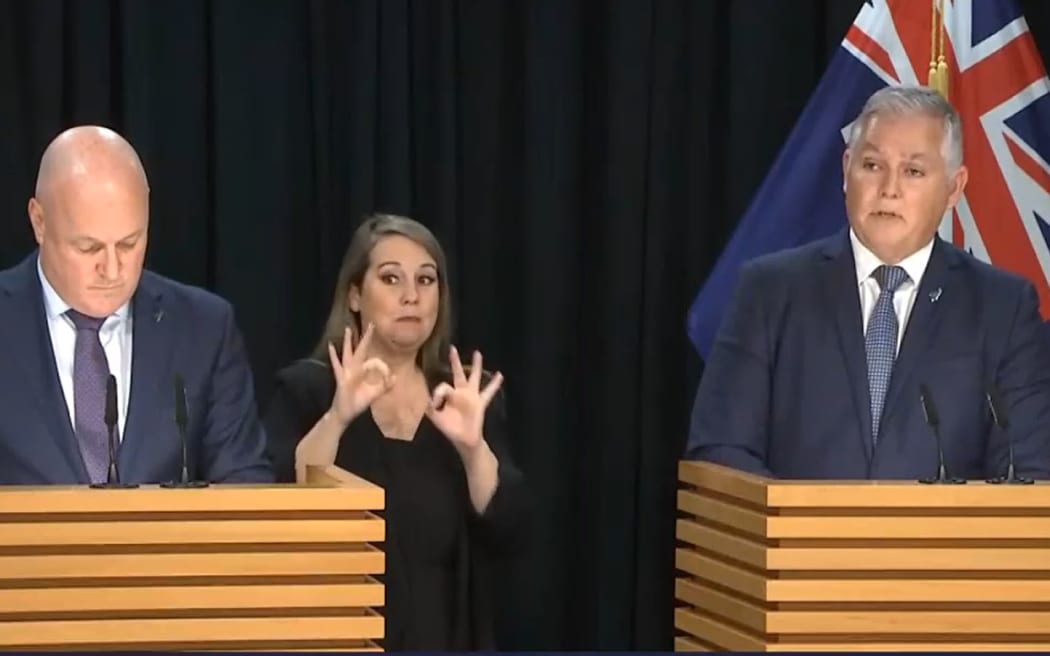These days governments roll out pre-Budget announcements almost daily for weeks in the run-up. It gives their selected plans more exposure at a time of their choosing - but it also attracts greater media scrutiny for each one. Mediawatch looks at how one played well for the minister last week - but this week, one was badly botched.

The PM and his corrections minister at a media conference requiring significant corrections. Photo: RNZ Mediawatch
"Did you cock up the press conference yesterday?" Newstalk ZB’s Mike Hosking asked the prime minister bluntly when he kicked off their weekly Tuesday morning live chat.
Christopher Luxon did notneed reminding that the big reveal of a bigger budget for bigger prisons had not gone according to plan the day before.
Luxon went on to say he sorted it out with Corrections Minister Mark Mitchell on the way out of the media conference.
But a roomful of reporters had already seen the pair struggle to explain exactly what jailhouse bang we would be getting for nearly two billion bucks in the upcoming Budget.
"The worst I’ve ever seen in the Beehive theatrette," Newshub's political editor Jenna told viewers of Monday’s Newshub at 6.
On Tuesday’s Morning Report, political editor Jo Moir said reporters usually get a heads-up or some kind of cheat-sheet summary in advance for an announcement like this - and RNZ had requested further info from the minister’s office several times in advance without success.
But on Morning Report soon after, Mitchell said he had only "muddied the waters" because he gave too much information - and all of it was correct, he insisted.
Hear Colin's report on this in this week's Mediawatch here
In the end, reporters did get clarification pretty swiftly after that messy media conference.
Press secretary Fleur Thompson emailed political reporters about 30 minutes after to clarify the number of prison beds to be delivered.
"In 70 words, she had managed to say what the prime minister and the Corrections minister could not say in a half-hour press conference," Richard Harman said on his website Politik.
Many in the media pointed out the irony of a Corrections announcement needing immediate corrections.
But another irony is the announcement last Monday was timed to maximise the chances of the message getting through to the public.
In days gone by, funding announcements like this would come all at once in the annual Budget.
But these days announcements are drip-fed to draw attention to things they want to highlight - via the news media, of course.
While the prisons one backfired, back-to-basics and cost-cutting announcements on education worked out well.
Education plans rolled out
On Tuesday, associate education minister David Seymour rolled out the school attendance daily dashboard.
Newshub political reporter Amelia Wade explained that was just a tweak - attendance is already reported by schools weekly, but it made plenty of news nonetheless.
Seymour also previewed his pre-Budget announcement about school lunches, when a provocative ACT claim about 'woke food' got the media’s attention.
All that followed a pre-Budget announcement on literacy in schools which worked a treat for the prime minister and Education Minister Erica Stanford after they summoned reporters to a school in Manurewa last week.
Luxon said just 56 percent of Year 8 students were at the expected level for reading, and just 35 percent for writing - and he said the past 30 years were an "experiment which failed".
"We're going to be introducing structured literacy into every state school, because this government is ambitious and aspirational for our kids. The evidence is clear that no child should be taught to read, looking at the picture, guessing the word. Those are the habits of poor readers that the whole word and balanced literacy approach says that we should be using," Stanford said.
"I do not want balanced literacy used in New Zealand," she said bluntly to one reporter's question.
Neither does NewstalkZB’s Heather du Plessis-Allan.
"Something I'm particularly excited about structured literacy. It's been announced today will become the new standardised way to teach all kids in New Zealand. We're not wasting any time," she told her listeners.
"You reckon this is a game changer?" she asked the minister.
"Massive game changer," Stanford confirmed.
After the interview, Du Plessis-Allan declared it "the millionth winner" Stanford had announced since becoming a minister.
"Thank God that woman is here to turn things around," she said.
What of the other approaches to literacy that are now being cast aside?
"'Whole word' is nuts. This is an idea we kids are taught to read by putting the word Apple next to a picture of an apple. That's crazy, isn't it? Now there are countless stories of schools that have switched to structured literacy using their own money and found remarkable results," she said.
It was a pretty crude and dismissive assessment of the alternative, which some teachers and experts do still back.
Among them NZEI president Mark Potter who struggled to convince du Plessis-Allan of that in a subsequent brief interview.
Next morning on Newstalk ZB, the Mike Hosking Breakfast led at 7am with the story.
"The whole sector, the universities, teacher education - it's a network of people that have let teachers down and let students down. It's so easy to blame social media equities and other issues," said Lifting Literacy Aotearoa chairperson Alice Wilson, a major advocate of structured literacy teaching.
"The results speak for themselves. Clearly, it doesn't work," Hosking said of other methods. He claimed all the evidence pointed to the superiority of structured literacy but cited none.
Former broadcaster Duncan Garner interviewed Erica Stanford on his own podcast and endorsed her approach. In a Stuff column the next day, he urged Stanford to "move some of the current leaders out of the way".
Stuff’s headline - $20b a year in education and our kids can’t read, write or count - took the entire annual budget of all education and overlooked the fact most kids really can.
Garner did not address the fact that some kids who really cannot might not be helped by structured literacy alone.
That was pointed out in a Science Media Centre briefing with the analysis of four education academics. But none were consulted in the media coverage alongside the delighted structured literacy advocates, the teaching representatives expressing reservations - and the opinionated broadcasters all endorsing the government move.
The evidence for and against current methods were summed up this week in an RNZ ‘what you need to know’ explainer - and by expert Dr Nina Hood on RNZ’s Nights.
With the exception of the AM Show on TV channel Three, there was little mention of the fact that reading recovery was being scrapped by the government’s new plan.
Weighing the pig
Another aspect not much mentioned was that measurement of success and failure in literacy is also tricky and contested.
Last December, Newsroom Pro editor Jonathan Milne pointed out there are anguished headlines all over the world when the OECD's International Student Achievement (PISA) survey results come out.
His headline said OECD school tests show weighing the pig doesn't fatten it - pointing to the limits of standards testing that he picked up working for UK specialist publication The Times Educational Supplement.
Milne pointed out New Zealand's PISA rankings have fallen faster than other countries in recent times, but educationalist Simon Breakspear warned him that politicians and schools policies targeting better PISA rankings might not actually deliver better-educated New Zealanders.
Improvements from a change of direction might also not show in the statistics for some time even if there is improvement.
The education minister will be hoping they do, both for the kids’ sake - and to sustain the media’s hearty endorsement of her.
In addition to near-universal approval on Newstalk ZB, Newshub's correspondent Patrick Gower took to social media to say "National have a leader-in-waiting".
"Erica Stanford extremely impressive in media appearances last 24 hours," he added on X.
"Have success here - and the ninth floor of the Beehive beckons for Stanford," his former TV3 colleague Duncan Garner concluded in the Stuff papers.
It seems a politician with a plan to get back to basics - presented clearly - gets big applause in the media.
But it is the opposite when the presentation is bungled, like it was for the $1.9b prison plan this past week.
One reason government make these pre-budget announcements long before the actual Budget is revealed is the hope journalists will amplify them in the media.
The public would be hoping the media scrutinise the suitability of the spending more - and spend less time on premature pronouncements on the prospects of the politicians making the announcements.


